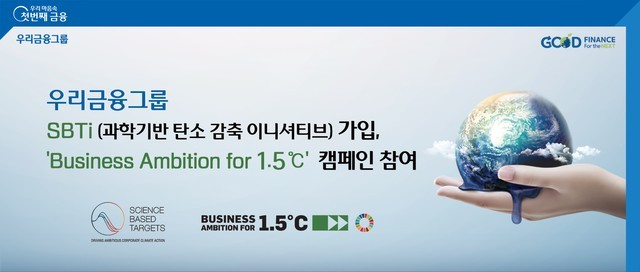 |
Woori Financial Group advertisement released last month reflecting its hope to be endorsed by SBTi, while deciding to join the global body`s `Business Ambition for 1.5 degrees Celsius` campaign. (Woori Financial Group) |
With carbon neutrality pledges and awareness in sustainability reshaping markets and industries around the globe, South Korean bank giants are in a fierce race to win global recognition on their respective drives designed to adopt environmental, social and governance values.
KB Financial Group, the nation’s No.1 banking group by assets, said last month that it was officially endorsed by the Science Based Targets Initiative, stressing that it has become the first financial institution in Asia to receive the green stamp from the global body.
SBTi is an organization that assesses corporate green goals based on science. In recent years, its endorsement has grown to be a key certificate to get for businesses seeking to validate their emissions targets.
Alongside, KB Financial, French bank La Banque Postale and Swedish private-equity firm EQT AB were endorsed simultaneously by the organization backed by the United Nations Global Compact and became the first group of global financial institutions to receive a nod from SBTi. KB said at the time that the three were the first financial groups to clinch the endorsement.
KB Financial’s net-zero goal dubbed “KB net zero star” focused on reducing its portfolio’s carbon emissions by 33.3 percent by 2030, 61 percent by 2040 and ultimately achieve neutrality by 2050. It plans to give loan benefits in terms of line of credits and interest rates for corporates that can prove their carbon offsetting plans.
KB Financial’s industry rivals Shinhan Financial Group, Woori Financial Group, Hana Financial Group and NH Financial Group recently announced their ambitions to receive stamps of approval from SBTi and other global organizations.
Woori on Tuesday said it has received an AA rating for its ESG goals from MSCI, formerly known as Morgan Stanley Capital International, a global provider of market indexes and analysis tools for ESG products. The AA rating is the second highest in the index provider’s seven-tier ratings system and classifies the recipient as “ESG leader.”
Woori Financial also said last month it has decided to participate in SBTi’s “Business Ambition for 1.5 degrees Celsius” campaign which aims to limit global temperature rise to 1.5 degrees Celsius above pre-industrial levels.
NH Financial in May has joined the United Nations Environment Programme Finance Initiative, which is a partnership between the UN and the global financial sector launched in 1992 to promote sustainable finance. Separately, NH Financial plans to funnel a combined 15 trillion won ($12.8 billion) for ESG investment by 2050.
Last year, Shinhan Financial’s flagship lender Shinhan Bank became the first banker to adopt the Equator Principles. A risk management framework developed for financial institutions for determining, assessing and managing environmental and social risks in projects. The move prompted other bankers to adopt the framework as well.
The race for ESG recognition has intensified as they believe that winning the market reputation of being responsible and sustainable institutions are key to their future growth, at a time when they are losing their presence in retail sector to fintech giants, according to market insiders. The green stamps are also important in terms of winning market credibility for their overseas expansion plans, they added,
Despite its efforts and larger-than-life plans, experts and onlookers claim that Korean financial firms are taking baby steps towards ESG at the moment.
A watchdog Financial Supervisory Service data released by a ruling party lawmaker here last month showed that direct ESG investments accounted for merely 1.3 percent of the local banks, insurers and brokerages’ total assets which came to some 5,588 trillion won as of end-June. The value of money committed to ESG-related funds stood at some 2 trillion won, which was only 0.3 percent of the total 753.8 trillion won set up for all funds, in the same period.
“South Korean financial groups have been relatively lackluster in ESG investments compared with other economies,” Rep. Yoo Dong-soo of the Democratic Party of Korea said.
“Financial authorities need to set up and launch financing regulations tied to climate change and a solid monitoring system for ESG to help businesses carry out green investments,” he added.
By Jung Min-kyung (
mkjung@heraldcorp.com)








